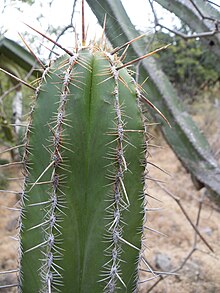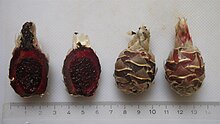Escontria is a genus of cactus. The only species is Escontria chiotilla, the chiotilla or jiotilla.
| Chiotilla | |
|---|---|

| |
| Chiotilla cactus | |

| |
| Ripe jiotilla fruit | |
| Scientific classification | |
| Kingdom: | Plantae |
| Clade: | Tracheophytes |
| Clade: | Angiosperms |
| Clade: | Eudicots |
| Order: | Caryophyllales |
| Family: | Cactaceae |
| Subfamily: | Cactoideae |
| Tribe: | Echinocereeae |
| Genus: | Escontria Rose |
| Species: | E. chiotilla
|
| Binomial name | |
| Escontria chiotilla | |
| Synonyms | |
| |
Description
editThe tree-like Escontria chiotilla is heavily branched with flat tops, forms clear trunks and reaches a height of 4 to 7 meters. The light green, cylindrical shoots have a diameter of 8 to 12 cm (3.1 to 4.7 in). It has 7 or 8 acute ribs, are densely covered with dark gray, elongated areoles that sometimes flow into one another. The central spine, which is usually one red-orange to yellow, later turns gray and is up to 20 mm (0.79 in) long. The 10 to 20 marginal spines, sometimes arranged somewhat comb-shaped, are yellowish-brown, later become grayish-white and are up to 12 mm (0.47 in) long.
The yellow, tubular to somewhat bell-shaped flowers, which open during the day, appear below the shoot tip. It bears dark red fruit comparable in appearance and texture to Pitaya, but smaller (3,5 cm).[2] The spherical, fleshy, scaled fruits are purple-brown and have a diameter of 5 cm (2.0 in) or more.[3]
Distribution
editThe species originates from Mexico (Guerrero, Michoacán, Oaxaca, southern Puebla).
Taxonomy
editThe first plants were discovered in 1864 by Frédéric Albert Constantin Weber, who sent material to George Engelmann. However, the first description as Cereus chiotilla was not made until 1897 by Karl Moritz Schumann.[4] The botanical name of the genus honors the Mexican engineer and temporary governor of San Luis Potosí Blas Escontria and Bustamante (1848–1906). The specific epithet chiotilla derives from the local name “Chiotilla” for the edible fruits of the plant. Spanish common names are “Chiotilla” and “Jiotilla”. In 1906, Joseph Nelson Rose placed it in the genus Escontria, which he had established.[5]
Another nomenclature synonym is Myrtillocactus chiotilla (F.A.C.Weber ex K.Schum.) P.V.Heath (1992).
References
edit- ^ Arreola, H.; Terrazas, T. (2017). "Escontria chiotilla". IUCN Red List of Threatened Species. 2017: e.T152145A121523692. doi:10.2305/IUCN.UK.2017-3.RLTS.T152145A121523692.en. Retrieved 19 November 2021.
- ^ "Jiotilla Plant (Escontria chiotilla [Weber] Britt. & Rose) as a new resource native to South Mexico". Retrieved 6 May 2012.
- ^ Anderson, Edward F.; Eggli, Urs (2005). Das grosse Kakteen-Lexikon (in German). Stuttgart (Hohenheim): Ulmer. p. 279. ISBN 3-8001-4573-1.
- ^ Schumann, Karl Moritz; Hirscht, Karl. (1899). Gesamtbeschreibung der Kakteen (Monographia cactacearum) /von Karl Schumann. Neudamm [Dębno, Poland?]: J. Neumann. doi:10.5962/bhl.title.10394.
- ^ States., United (1906). "Contributions from the United States National Herbarium". Smithsonian Institution Press. Retrieved 2023-09-24.
- Britton, N. L.; Rose, J. N. (1922). The Cactaceae. Descriptions and Illustrations of Plants of the Cactus Family. Vol. III. Washington: The Carnegie Institution of Washington. p. 65.
- Escontria On-line Guide to the positive identification of Members of the Cactus Family: Escontria
